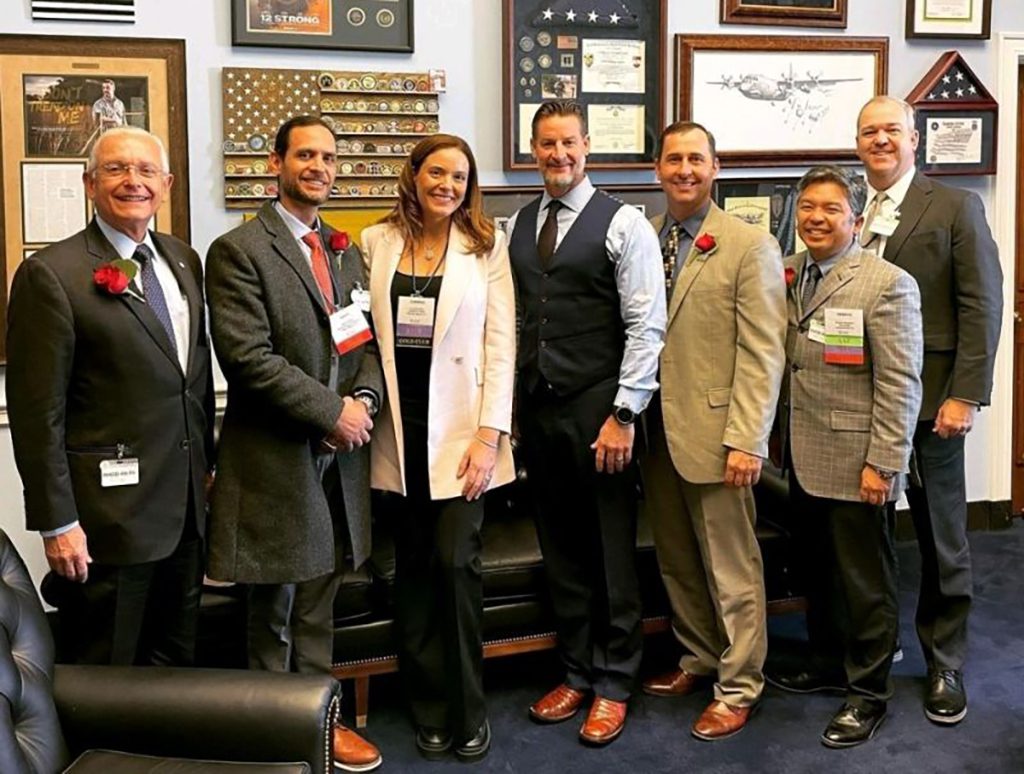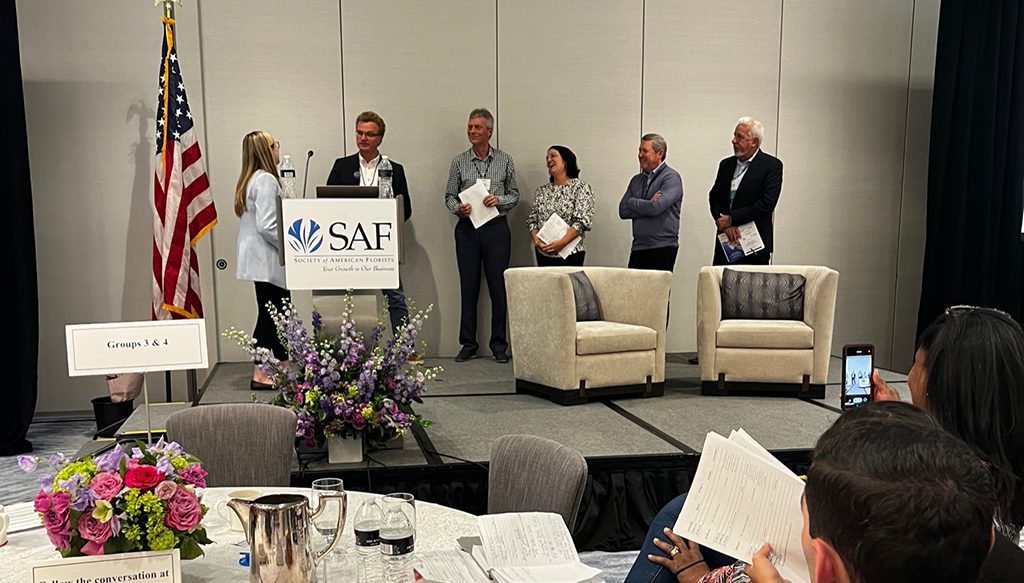
Attendees at SAF’s 2022 Congressional Actions Days met with legislators on Capitol Hill to advocate for the floral industry’s needs. (From left to right) Augusto Solano of Asocolflores; Sahid Nahin of Above All Flowers and New Blooms Solutions; Corrine Heck of Details Flowers Software; Florida Rep. Greg Steube; Austin Bryant of Heart of Florida Greenhouses; Renato Cruz Sogueco, AAF, PFCI of BloomNet; and Eric Hagstrom of Albin Hagstrom and Son Inc.
Preserving a hard-fought increase in floriculture research funding dollars. Price certainty for fresh floral product. A stable agricultural workforce. And a reminder to Congress that the Farm Bill is up for renewal this year. On March 20-21, floral pros from around the country will educate a new Congress on these industry priorities during the Society of American Florists’ Congressional Action Days — and experience an insider’s view of Washington D.C. while doing it.
“Each year Congressional Action Days brings something new — meeting new , learning about different aspects of the industry and the new issues that are brought to light,” says Jodi McShan, AAF, of McShan Florist in Dallas. “It is great to see how what we are asking for progresses each year, and how our actions really help Congress and their staffs understand where we are coming from. It helps them view the issues in a new light.”
The Issues — and SAF’s ‘Asks’
Maintain the new funding level for the Floriculture Nursery & Research Initiative (FNRI). Last December, Congress passed the FY-2023 spending bills and included $1 million increase for FNRI — a funding increase SAF members asked for during last year’s CAD. This vital Agricultural Research Service (ARS-USDA) program works to address pest and disease problems, tackle the challenges of climate change and enhance the efficiency of production practices.
This year, the increased funding for FNRI will enable USDA and its university partners to pursue Unmanned Aircraft Systems (UAS) technologies to aid floriculture producers with pest and disease scouting, monitor abiotic stresses and even apply crop production and protection products.
The Ask: Maintain FNRI funding at its 2023 fiscal year level in fiscal year 2024.
Renew the Generalized System of Preferences. The Generalized System of Preferences (GSP) has been in place for more than 45 years promoting opportunity for the least economically developed countries abroad and supporting U.S. businesses that rely on imported products to sustain and grow their businesses.
U.S. floral retailers have benefitted greatly from duty-free imports of cut flowers both through trade agreements and GSP. In 2021, duty-free status across all programs resulted in approximately $100 million per year staying in the floral industry, according to import value estimates from the Economic Research Service — and an additional $20 million would have been added had the GSP tariff relief been in place.
that figure doesn’t include the missing GSP import tariff savings from 2021. GSP authorization lapsed on Dec. 31, 2020, adding significant costs to main street businesses trying to recover from the economic impact of COVID-19 and cope with inflationary pressures not seen in 40 years.
The Ask: Move swiftly to reauthorize this important program and help reestablish a level of price stability that GSP brings to the floral market.
Address the agriculture labor crisis. Severe labor shortages and forced wage increases continue to impact growing operations and the floral supply chain. These shortages — due to ineffective federal policy on agriculture labor — jeopardize the future success of the floriculture sector and the vitality of rural economies, which rely upon agriculture as a primary economic driver.
There is reason for hope: Late last year Congress came close to reforming agricultural labor policy when it considered legislation to take steps to modernize availability of foreign agricultural labor.
The Ask: Congress must work diligently to find comprehensive solutions to agricultural labor challenges. The status quo is a risk to economic and border security.

Role playing exercises helped attendees prepare for meetings with legislators.
New to Capitol Hill? No Problem
If you’ve never lobbied, SAF will get you ready. Before heading to the Hill, SAF Senior Lobbyist Joe Bischoff will brief attendees on the issues and facilitate role playing exercises to prepare everyone for the next day’s visits.
“The staff at SAF give us everything we need to be prepared to visit with our representatives and speak confidently about the issues that are most important to our industry,” says Tim Farrell, AIFD, PFCI, of Farrell’s Florist in Drexel Hill, Pennsylvania.
If you’re a first-time CAD attendee, SAF will group you with CAD veterans who can guide you through the meeting process.
“I was initially very nervous about speaking with our representatives and senators about SAF’s issues, but by the end of the day, it was a piece of cake,” says 2022 first-timer Andy Fiannaca of Sparks Florist in Sparks, Nevada. “The floral industry needs as many people as possible to make our voices heard by Congress, so put CAD 2023 on your calendar now!”
Join your peers to tell legislators why the floral industry’s priorities are important to you and what your business is experiencing at home during SAF’s Congressional Action Days, March 20-21, in Washington. Register today and book your hotel room by Feb. 24 to reserve SAF’s preferred rate.
Katie Butler is the senior vice president of the Society of American Florists.
